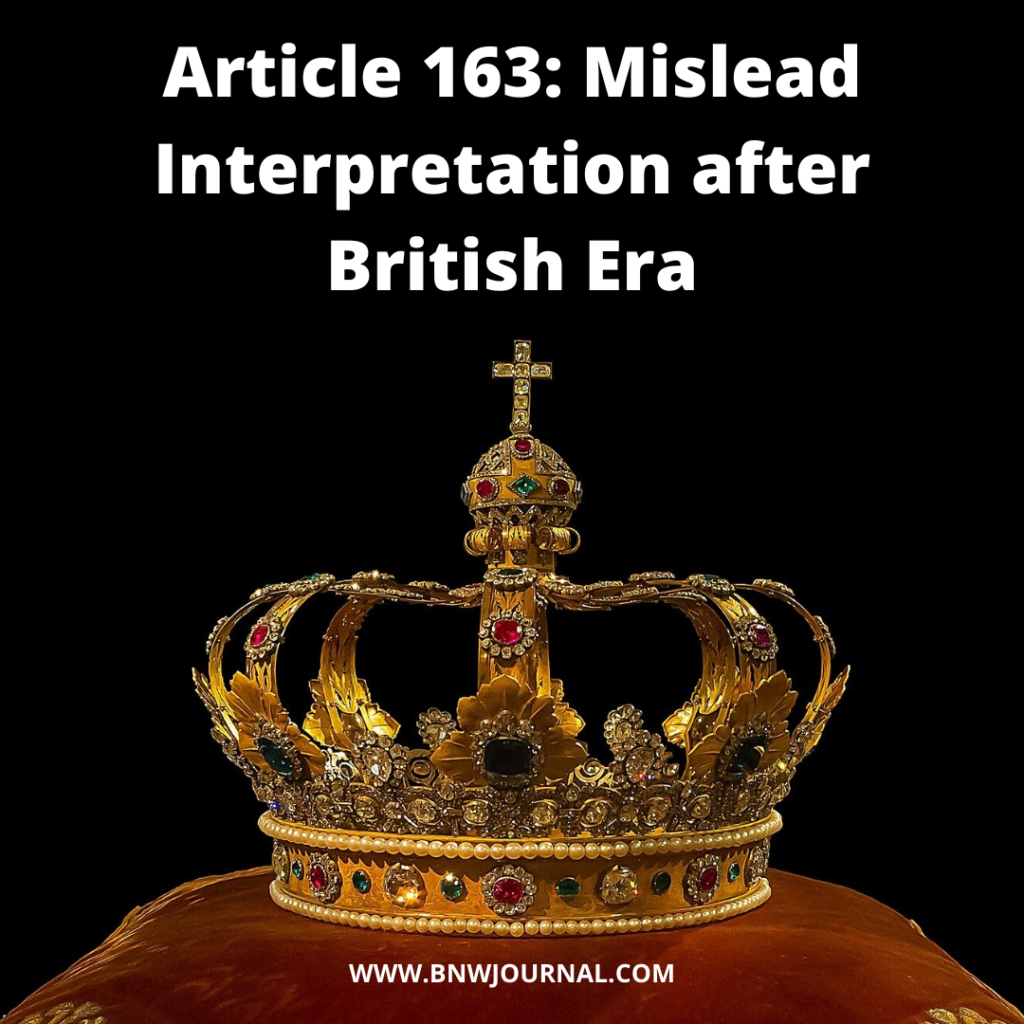![]()
Introduction
Article 163 briefly takes about the aid and advice of the Council of Ministers to the Governor.[1] Article 163(1) explains that there shall be a Council of Ministers to aid and advice the Governor. It is further the independent decision of the Governor to may or may not follow the advice of the Council of Ministers.[2] The decision of the Governor in his discretion shall be final. The decision cannot be questioned on the grounds of his discretion.[3] The Court shall not question the Ministers’ advice to the Governor. [4]

Evolution of Article 163
The framers of the Constitution were very certain in restricting the powers of the Governor. The Government of India act acts as a pioneer to the constitutional provisions of the Council of Ministers. Article 163 was verbatim to section 50 of the Government of India Act, 1935. Subsection (3) was omitted from the Constitution. Article 163 (3) is a reproduction of section 51(4) of the Act of 1935. Before the enactment of 1935 act, the Governor was the real executive head of the state. However, after the proclamation of the said Act, certain restrictions are place upon the powers of the Governor with limited responsibility. But under the Constitution, the Governor is the nominal head of the state. The real powers are with the Council of Ministers.
The Arbitrariness of Power
The President and the Governor are consider to be the constitutional heads of the Centre and the State respectively. The President and the Governor act on the aid and advice of the Council of Ministers (Article 74 and 163) with the only difference that unlike the Governor, the President cannot exercise the functions in his discretion. Under normal circumstances, the Governor may act under the guidance of the Council of Ministers. Any special or emergencies can make the Governor act according to his discretion by either accepting the decision or by declining the advice provided by the Council of Ministers.
Such denial of advice can lead to many controversial subjects in the Assembly. The Act of 1935 clearly explains the scope of special responsibilities of the Governor under section 52. It can be read in accordance with section 50. But there is no explicit provision specified in the Constitution for the same. This can lead to the scope of blatant misuse of such discretionary powers.
The Controversy of Discretionary Powers
Article 163 read with Article 361 provides absolute immunity to the Governor and are not subject to judicial review.[5] Furthermore, there are many instances where the decision of the Governor led to the confrontation of the Council of Ministers yet undecide by the Courts. The West Bengal Chief Minister alleged that the Governor insulted her and spoke to her like a block-level functionary of the BJP whose government is at the Centre.[6]
Another such case is the resignation of Meghalaya Governor Mr V. Shanmuganathan alleging of sexually harassing women in the Rajya Sabha. The act done by the Governor is protect by our Constitution under Article 361. It emphasises that the Governor or the President is not answerable to any Courts for any act done by him purporting to be done by him in the exercise and performance of those powers and duties.[7] However the Centre failed to follow the decision of the Supreme Court in B.P. Singhal’s case and instead of sacking the Governor from his post, the Centre chose to get rid of him by forced resignation.
This is due to the absolute immunity gained by the Governor during his tenure. Similarly, the Madhya Pradesh High Court quashed the FIR filed against the late Governor Ram Naresh Yadav for his alleged involvement in the forest guard recruitment scam. He enjoy privilege under article 361(2) and (3) that no criminal proceedings and no process of arrest or imprisonment is issue from any Court during the term of the office of President and Governor and filing of FIR do not fall in its ambit. In addition to that, the conduct of the President can be challenged in the Court. Nowhere in the Constitution exists an explicit clause regarding the conduct of Governor being challenge by any Courts.
Conclusion
The Government of India Act, 1935 provides vast powers vested upon the Governor under section 50 to 55 of the act which is absent in our Constitution. Although the position of the President and the Governor is titular, limited restrictions are placed only for the President and not applicable to the Governor. Article 163(2) and (3) provides unlimited Constitutional power that might lead to a greater chance of misuse by the Governor. The Constitution must adhere to the principles for a responsible government by introducing deliberate amendments required.
References:
[1] Article 163 of the Constitution of India,1949.
[2] See, Article 163(1) of the Constitution of India,1949.
[3] Article 163(2) of the Constitution of India,1949.
[4] Article 163(3) of the Constitution of India,1949.
[5]Shri Pratapsing Raojirao Rane v. The Governor of Goa, AIR 1999 Bom 53.
[6] https://indianexpress.com/article/india/governor-insulted-me-spoke-like-a-bjp-block-chief-west-bengal-cm-mamata-banerjee-4736094/
[7] Article 361 of the Constitution of India,1949.



0 Comments